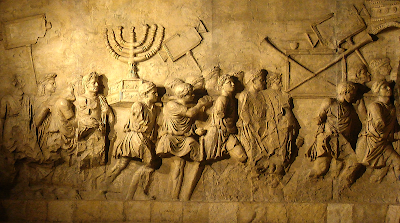The letter of Revelation, written during the reign of the brutal Roman emperor Domitian (ruled AD 81-96), addressed an audience who wondered if being a Christian was worth the cost. General resentment towards Christians had started about 30 years earlier when Nero blamed them for the Great Fire of Rome.
 |
| The Great Fire of Rome, AD 64 |
In accordance, an arrest was first made of all who pleaded guilty; then, upon their information, an immense multitude was convicted, not as much of the crime of firing the city as of hatred against mankind. Mockery of every sort was added to their deaths. Covered with the skins of beasts, they were torn by dogs and perished, or were nailed to crosses, or were doomed to the flames and burnt, to serve as a nightly illumination, when daylight had expired. (Annals, 15.44)
 |
| The Torches of Nero by Siemiradski, 1876. Look closely as Christians are the torches. |
It was unclear whether the Christians "pleaded guilty" to arson or simply to being Christian. None-the-less they were severely punished and as Tacitus notes, not so much for the crime, but for "hatred against mankind." Christians objected to many elements of Roman culture and this caused them to be viewed in this way.
In AD 70 the temple in Jerusalem was destroyed by the Romans. This was the second destruction of the Temple, the first being in 586 BC by the Babylonians. This event forever changed the face of Judaism and its relationship to the sacrificial system.
Then in AD 79 Mount Vesuvius erupted, blacking out the sky for hundreds of miles and burying Pompeii.
 |
| The Arch of Titus - carrying away the spoils from the Temple. |
 |
| Mt Vesuvius as seen from the ruins of Pompeii |
Times were turbulent and to make matters worse, Domitian, who thought of himself as divine, began enforcing emperor worship. When he appeared in public he would urge the crowds to shout:
All hail to our Lord (kurios, which is the same word used for Jesus in the NT) and to his Lady!
 |
| Domitian |
Domitian put police in place to enforce his veneration and those who did not comply were banished or even executed.
This is the context for Revelation. The recipients of the letter were feeling pressure to assimilate with the Roman culture, as being a Christian was beginning to cost them convenience, social status, and even their lives.
They needed to hear that God was in control and proclaim that Kurios Christos, Christ is Lord, and not Kurios Kaisaros, Caesar is Lord, even in the face of death.
Revelation is one of the most misinterpreted texts in the Bible - which is a shame because such interpretations miss out on how incredibly practical the letter is.
Check back tomorrow for more on Revelation.
2 comments:
keep posts on Revelation coming - it wasn't until I read heretic Brian McLaren's book The Secret Message of Jesus that I even began to conceive that Revelation wasn't about the end times. That was a big paradigm shift for me.
(the heretic comment is a joke)
Will do. Just read some reviews of the McClaren book, seems like a very worthy read. You might also check out Herzog's Jeus, Justice, and the Reign of God.
Post a Comment